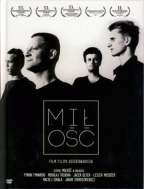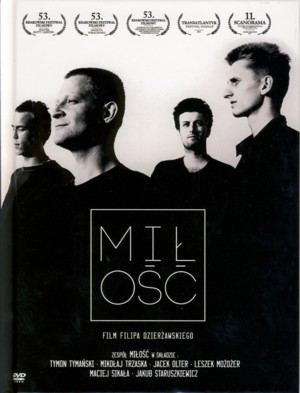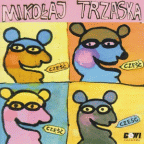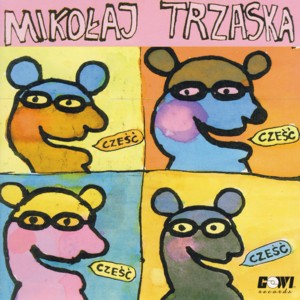Record Reviews
2 Reviews Found. Use search to find more reviews or follow the links in the review text.
  | MILOSC ~ MILOSC
AGORA 9788326812972 (Barcode: 9788326812972) ~ POLAND ~ Jazz
Recorded: 2008 - 2012 Released: 2012
This is the DVD version of the film "Milosc" by Polish director Filip DzierzawskiFind albums by this artist, which is a documentary about the Polish Jazz ensemble MiloscFind albums by this artist, which was the most influential group on the Polish Jazz scene in the 1990, revolutionizing the approach to Jazz in the country, establishing the Yass sub-genre and most importantly waking up the local scene from the mainstream lethargy, which was overwhelmingly dominating the scene for almost two decades that preceded the 1990s.
Milosc was formally founded in April 1988, when the group which included bassist Tymon TymanskiFind albums by this artist and saxophonist Mikolaj TrzaskaFind albums by this artist changed its name to Milosc. Soon after the group was joined by clarinetist Jerzy MazzollFind albums by this artist, who left after a brief stay and then the drummer Jacek OlterFind albums by this artist and pianist Leszek MozdzerFind albums by this artist joined the group creating the core quartet of Tymanski / Trzaska / Olter / Mozdzer, which recorded the group´s debut album. A year later the quartet expanded into the full stable lineup when saxophonist Maciej SikalaFind albums by this artist joined them to create the quintet version of Milosc. After several fruitful years and a series of brilliant albums, two with legendary American trumpeter Lester BowieFind albums by this artist, the group started to disintegrate, when Mozdzer left in 1998 to pursue a solo career, Olter died tragically after a long mental illness and Trzaska left the group in 2001. A year later the group played its last gig and formally announced the end of its activity in July 2002, after fourteen years of existence.
The documentary, which was filmed during a four years period (2008-2012) pays tribute to the group´s history and to the individual personalities, focusing on the meeting of the Milosc members organized in order to prepare for a concert by the legendary original lineup, less Olter of course who was replaced by drummer Kuba StaruszkiewiczFind albums by this artist. The documentary moves between the scenes captured during these rehearsals, historic footage and interviews with individual members, speaking their minds out. The director wisely avoids any external commentary, simply presenting the reality portrayed by the camera, leaving the spectator free to reach his own conclusions. Although not a typical documentary by any standard, the film presents a cohesive and intelligent document, which highlights several profound observations about people, music and culture.
Milosc was all about freedom. Considering the fact that the group was established at the crucial point of modern Polish political history, when the oppressive Socialistic Regime was about to collapse and Poland was finally to achieve its new political Freedom, Milosc expressed the same feeling of upheaval, but on an artistic plane. Polish Jazz, which exploded with incredible vitality and freedom of expression in the 1960s, slowly ran out of steam as a result of economic and social hardships and by the late 1970s and 1980s it was almost completely devoid of any truly spirited, adventurous, inspired activity and completely immersed into ambitionless mainstream. The young generation of Polish Jazz musicians and fans was about to rebel against this stagnant state of affairs and Milosc was one of the first and most successful demonstrations of this rebellion.
Although initially associated with Free Jazz, Milosc never actually played Free Jazz, surely not close to its American origins established by Albert AylerFind albums by this artist, Eric DolphyFind albums by this artist and John ColtraneFind albums by this artist. The group was an amalgam of many musical influences and created a unique and new approach and stylistic expression, which eventually was christened Yass. And Yass was more clear about what it didn´t want to be rather than about what it wanted to be, a rebellion against "pretty" melodic, carefully planned, well defined by harmonic conventions music. No more of that old-fashioned bullshit! Yass was "dirty", imperfect, spontaneous, unconventional and constantly changing, but it did not exclude the element of melody and standard meters. Free? Yes by all means, but definitely not Free Jazz.
From the very start Milosc was an impossible combination of conflicting strong personalities and diametrically different musical approaches. Why it managed to exists for such a long time is a mystery and a miracle. But musical miracles do happen and when they do, the listeners are the ones to collect the crops. The musicians, initially euphoric, start to suffer at some point and then simply can´t take it any more. The key conflict inside Milosc was always the clash between Trzaska and Mozdzer: a rebel and visionary and a classically trained hipster. This fundamental conflict was what brought Milosc to its knees, but it wasn´t of course the only factor. Poland and its cultural environment went through a dramatic change following the fall of the Socialist Regime, and a new reality emerged; politically, socially and of course culturally. This new reality opened up new possibilities and closed the lid on many others, which existed earlier. Such dramatic environmental changes have a profound impact on people, and musicians are people after all.
The 2008 meeting between the Milosc members, which is the focal theme of this film, shows how profound these changes are, so profound that although they are able to play together, they are unable to communicate as human beings. Separated by an unbreachable chasm Trzaska and Mozdzer are further apart that ever, the former representing the Polish Avant-Garde scene still being its non-formal leader in every sense and the latter representing the absolutely opposite ad-nauseam commercialism; a clash of Titans, which simply has no peaceful solutions.
So is this a film about failure? About ideas and values that get outdated? Personally I don´t think so. Yes, sometimes not everything works as planned, but that does not necessarily mean a failure and in some rare occasions failures can be magnificent. I still very much believe that the same values that stood behind Milosc: freedom, pioneering search for artistic truth, personal integrity and the courage to do your own thing, are as much valid today as they have always been. Opportunism and conformism have always been and still are the root of evil.
This film is a wonderful piece of musical history, which sheds some light on a much neglected period in the history of Polish Culture. Although perhaps unintended, it also spotlights some profound artistic and ethic dilemmas, leaving the resolutions to the spectators. An absolute must to all Polish Jazz connoisseurs, wherever they might by!
| | Updated: 12/04/2019Posted: | DVD 1 Digipak Recommend To A Friend |
  | MIKOLAJ TRZASKA ~ CZESC, CZESC, CZESC…
GOWI 37 (Barcode: 786497165322) ~ POLAND ~ Jazz
Recorded: 1995 Released: 1996
This is the debut album by legendary Polish saxophonist / clarinetist / composer / bandleader Mikolaj TrzaskaFind albums by this artist, recorded while Trzaska was still a member of the no less legendary Yass ensemble MiloscFind albums by this artist, which revolutionized the Polish Jazz scene in the 1990s. The album was recorded in a quartet setting with keyboardist Jowita CieslikiewiczFind albums by this artist (from the legendary all female ensemble Oczi CziorneFind albums by this artist) and two Milosc related musicians: bassist Tomasz HesseFind albums by this artist and drummer Jacek OlterFind albums by this artist. Didgeridoo player Szymon RoginskiFind albums by this artist appears as a guest musician. The album presents nine tracks, seven of which are original compositions by Trzaska, one is a traditional song and one was co-composed by Hesse and Tomasz GwincinskiFind albums by this artist (a legendary representative of the Bydgoszcz music scene and considered as one of the creators of the Yass idiom).
From a twenty years long retrospect this album sounds today even more poignant than when I heard it for the first time at the time it was originally released. After closely following the musical path and development of Trzaska during that period, it becomes clearly evident that this album was not only revolutionary, but even more importantly so it was completely prophetic as far as Trzaska´s future was about to reveal itself. It includes all the elements in his music, which were about to burst out later on: a superb sense of melody, always full of tension and suspense, which would become Trzaska´s trademark in his remarkable career as a creator of some of Poland´s most important soundtracks to no less important movies. It also includes the element of cyclic, almost trans-like, hypnotic repetition, which was to characterize Trzaska´s music in the ensembles he led during those twenty years. And last but not least it also features his obvious search of his musical roots, which was about to blossom when Trzaska discovered Jewish music.
Musically this album lost absolutely nothing of its charm and strength over time and as already mentioned above is an absolutely marvelous statement, which not only depicts the essence of the Yass era, with its nonchalance, daring and open-mindedness on one hand and the total commitment to doing your own thing on the other, but also captures in an embryonic stage one of Poland´s most creative and significant musical minds.
Sadly this album never really achieved the iconic status it truly deserves, which complies with the ancient saying: "No Prophet is welcome in his hometown", which tragically is more often true than not. Since it seems to be still available, I can´t think of a Polish Jazz album that deserves to be in every serious Polish Jazz collection than this one, not only for its historic significance but simply because it contains so much great music. Don´t even think twice!
| | | CD 1 Recommend To A Friend |
|







